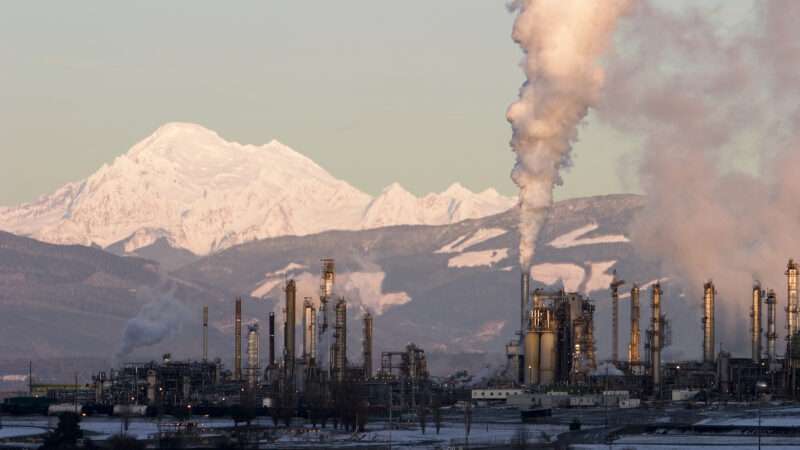Washingtonians Uphold State’s Climate Change Program

Voters in Washington have rejected ballot initiative 2117, upholding the state’s cap-and-trade program under the Climate Commitment Act (CCA). About 62 percent of voters went against the measure, with 58 percent of the vote counted as of press time.
Passed in 2021, the CCA established Washington’s cap-and-trade program for greenhouse gas (GHG) emissions. Under this mechanism, the state government sets an emissions cap which businesses whose annual GHG emissions exceed 25,000 metric tons of carbon dioxide (CO2) equivalent must meet. If they can’t, companies must purchase additional allowance credits at a quarterly auction. The revenue generated at these auctions funds clean energy and environmental protection programs authorized by the CCA. Companies that meet the 25,000 metric ton emissions threshold but do not participate in the auction face fines of up to $50,000 per day.
In the program’s first auction in February 2023, the price of a metric ton of CO2 equivalent was set at $48.50 and generated a revenue of almost $300 million. At the state’s most recent auction, held in September 2024, one metric ton of CO2 equivalent was traded for $29.88, bringing in more than $237 million in revenue, $157 million of which will go to CCA programs. The CCA’s total operating budget is nearly $3 billion, according to the program’s dashboard.
The CCA has drawn criticism from Washingtonians for many reasons, the most prominent being cost. Before the program took effect, Gov. Jay Inslee (D) said the CCA would have a “minimal impact” and only add “pennies” in additional costs at the pump. After the CCA was implemented, Washington’s gas prices became one of the highest in the nation, jumping by as much as 50 cents per gallon.
Opponents of Initiative 2117, including state representative Joe Fitzgibbon (D–Seattle), believe that price gouging from oil companies is to blame for these high costs. However, analysis from Todd Myers, the vice president for research at the Washington Policy Center and supporter of the ballot measure, has found a direct link between the cost of CO2 at quarterly auctions and the price at the pump.
Despite its high cost, the emissions reduction impact of the program is unclear. “We don’t have any data on statewide emissions since 2019, so we don’t even have a baseline against which to compare. It is likely that the state’s CO2 cap did reduce emissions in 2023 at very high cost, however. It is also likely that the state violated the cap because we had to flood the market with low-cost CO2 allowances due to the high cost,” Myers tells Reason.
To Myers, the only clear thing is that “state projects funded by the CO2 tax are often extremely wasteful and focused on political agendas, expanding government and giving to special interests rather than helping the environment.” He cites the rules for grant programs for community decarbonization, which do not prioritize reducing emissions but instead award money to groups that include union rules in their contracts and cater to disadvantaged communities.
Indeed, many of the CCA’s projects do little to meaningfully lower greenhouse gas emissions. The largest awarded CCA project is the $150 million Washington Families Clean Energy Credits Grant Program, which awards a one-time utility bill credit of $200 to low- and moderate-income families to assist them with “the clean energy transition.” The King County Metro, the public transit authority that services Seattle, has received over $66 million “to support operational and capital expenses.” It is the third-largest CCA awardee. Meanwhile, the “GHG Emissions Reduction” program includes more than $1.2 million for the Department of Fish and Wildlife (DFW) to study the feasibility of adding solar and micro-hydro projects at DFW sites across the state.
Despite the program’s wasteful spending and high costs, Washingtonians have voted to keep the CCA intact by rejecting Initiative 2117. The resounding public support could inspire other states to adopt similar cap-and-trade measures. Still, without meaningful reforms to the oversight and efficiency of the program, Washington residents could be left to foot the bill for an ineffective and expensive carbon reduction scheme.
The post Washingtonians Uphold State’s Climate Change Program appeared first on Reason.com.
